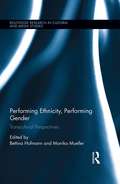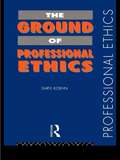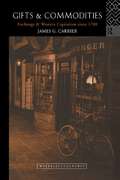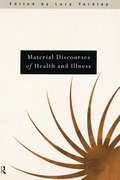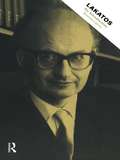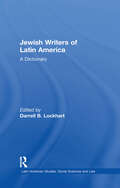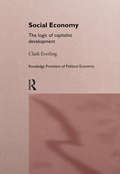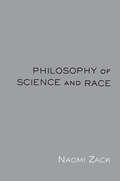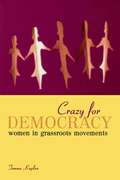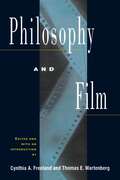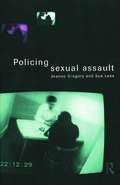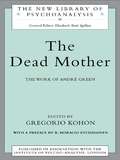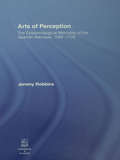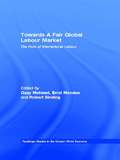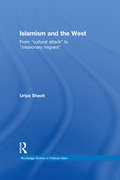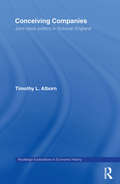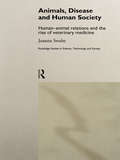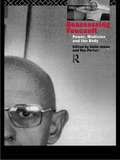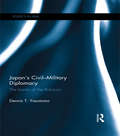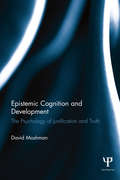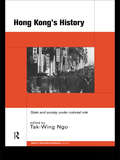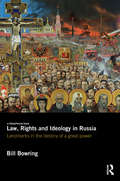Special Collections
Benetech’s Global Certified Accessible Titles
Description: Benetech’s GCA program is the first independent third-party EPUB certification to verify ebook accessibility. By creating content that is born accessible, publishers can meet the needs of all readers. Learn more: https://bornaccessible.benetech.org/
- Table View
- List View
Performing Ethnicity, Performing Gender
by Bettina Hofmann and Monika MuellerPerformance and performativity are important terms for a theorization of gender and race/ethnicity as constitutive of identity. This collection reflects the ubiquity, diversity, and (historical) locatedness of ethnicity and gender by presenting contributions by an array of international scholars who focus on the representation of these crucial categories of identity across various media, including literature, film, documentary, and (music) video performance. The first section, "Political Agency," stresses instances where the performance of ethnicity/gender ultimately aims at a liberating effect leading to more autonomy. The second section, "Diasporic Belonging," explores the different kinds of negotiations of ethnic performances in multi-ethnic contexts. The third part, "Performances of Ethnicity and Gender" scrutinizes instances of the combined performance of ethnicity and gender in novels, films, and musical performances. The last section "Cross-Ethnic Traffic" contains a number of contributions that are concerned with attempts at crossing over from "one ethnicity into another" by way of performance.
The Ground of Professional Ethics
by Daryl KoehnAs each week beings more stories of doctors, lawyers and other professionals abusing their powers, while clients demand extra services as at a time of shrinking resources; it is imperative that all practising professionals have an understanding of professional ethics.In The Ground of Profesional Ethics, Daryl Koehn discusses the practical issues in depth, such as the level of service clients can justifiably expect from professionals, when service to a client may be legitimately terminated and circumstances in which client confidences can be broken. She argues that, while clients may legitimately expect professionals to promote their interests, professionals are not morally bound to do whatever a client wants.The Ground of Professional Ethics is important reading for all practising professionals, as well as those who study or have an interest in the subject of professional ethics.
Gifts and Commodities
by James G. CarrierThree hundred years ago people made most of what they used, or got it in trade from their neighbours. Now, no one seems to make anything, and we buy what we need from shops. Gifts and Commodities describes the cultural and historical process of these changes and looks at the rise of consumer society in Britain and the United States. It investigates the ways that people think about and relate to objects in twentieth-century culture, at how those relationships have developed, and the social meanings they have for relations with others. Using aspects of anthropology and sociology to describe the importance of shopping and gift-giving in our lives and in western economies, Gifts and Commodities: * traces the development of shopping and retailing practices, and the emergence of modern notions of objects and the self * brings together a wealth of information on the history of the retail trade * examines the reality of the distinctions we draw between the impersonal economic sphere and personal social sphere * offers a fully interdisciplinary study of the links we forge between ourselves, our social groups and the commodities we buy and give.
Material Discourses of Health and Illness
by Lucy YardleyMaterial Discourses of Health and Illness applies discursive approaches to the field of health psychology, in stark contrast to the bio-medical model of health and illness. The discursive approach uses the person's experience and feelings as the central focus of interest, whereas the more traditional models regarded these as coincidental and relatively unimportant. The book provides an accessible and compelling introduction to social constructionist and discursive approaches to those with limited previous knowledge of socio-linguistic theory and research. It provides practical examples of how these approaches can be applied to the field of health psychology with a collection of sophisticated discursive analyses which demonstrate the distinctive contribution that can be made by psychologists to a field that has been largely dominated by sociologists and anthropologists.
Lakatos
by Brendan LarvorLakatos: An Introduction provides a thorough overview of both Lakatos's thought and his place in twentieth century philosophy. It is an essential and insightful read for students and anyone interested in the philosophy of science.
Rational Woman
by Raia ProkhovnikTo feminists and some postmodernists reason/emotion and man/woman represent two fundamental polarities, fixed deep within Western philosophy and reflected in the structures of our languages, and two sets of hierarchical power relations in patriarchal society. Raia Prokhovnik challenges the tradition of dualism and argues that rational woman need no longer be a contradiction in terms. Prokhovnik examines in turn: · the nature of dichotomy, its problems and an alternative · the reason/emotion dichotomy · dichotomies central to the man/woman dualism, such as sex/gender and the heterosexual/ist norm
Jewish Writers of Latin America
by Darrell B. LockhartFirst published in 1997. Routledge is an imprint of Taylor & Francis, an informa company.
Social Economy
by Clark EverlingContrary to much Marxist thought, Everling does not view socialism as an antithesis to capitalism, and argues that socialism is, among other things, an objective development of capitalism. As capitalism develops it creates the premises for social development which are also the bases for a socialist and democratic construction of society.Drawing on economics, urban geography, political theory and Marxism, Social Economy:* Examines the evolution of capitalism from its early industrial to its present urban and global forms* Shows how Marx understood the economy as a unity of production, distribution, exchange and consumption engaged in social reproduction* Explores the contradictory evolution of US corporations and urban development from 1945 to the present* Argues that urban space involves requirements for social and individual reproduction which extend well beyond limits inherent in transnational corporate private appropriationUsing his unique arguments, Everling makes the case that economic expansion can now best be secured by forms of development that take us beyond the limits of capitalism and point towards a democratic and socialist society.
Philosophy of Science and Race
by Naomi ZackFirst published in 2003. Routledge is an imprint of Taylor & Francis, an informa company.
Crazy for Democracy
by Temma KaplanCrazy for Democracy vividly shows, through the lives of six women in the United States and South Africa, just what can be and is being accomplished to change our lives. At a time when we're depressed about democracy, pessimistic about race relations, and anxious about feminism, Crazy for Democracy vividly shows, through the lives of six women in the United States and South Africa, just what can be and is being accomplished to change our lives. In building real social movements to achieve a safe environment, win human rights, and safeguard their homes, these grassroots feminist leaders have been creating democratic institutions to achieve social justice for us all.
Philosophy and Film
by Cynthia A. Freeland and Thomas E. WartenbergPhilosophy and Film moves from broad theoretical reflections on film as a medium to concrete examinations of individual films.
Policing Sexual Assault
by Jeanne Gregory and Sue LeesPolicing Sexual Assault provides a detailed account of current police practice in the UK in response to sexual assault. The authors use case studies and interviews to find out why when the number of rape cases has almost trebled since 1985, the proportion of cases resulting in a conviction has dropped from 24% to 8.6%. Chapters cover: an overview of existing research police culture police recording practices the role of the Crime Prosecution Service male rape analysis of the judicial process interviews with complainants and first-hand accounts of their experiences proposals for reform. The authors place their findings within the context of theoretical debates about domestic and sexual violence and examine the gap between official condemnations of male violence, as enshrined in law, and the realities of the victims' (male and female) experiences - whereby the violence is too often condoned.
The Dead Mother
by Gregorio KohonThe Dead Mother brings together original essays in honour of André Green. Written by distinguished psychoanalysts, the collection develops the theme of his most famous paper of the same title, and describes the value of the dead mother to other areas of clinical interest: psychic reality, borderline phenomena, passions and identification. The concept of the 'dead mother' describes a clinical phenomenon, sometimes difficult to identify, but always present in a substantial number of patients. It describes a process by which the image of a living and loving mother is transformed into a distant figure; a toneless, practically inanimate, dead parent. In reality, the mother remains alive, but she has psychically 'died' for the child. This produces a depression in the child, who carries these feelings within him into adult life, as the experience of the loss of the mother's love is followed by the loss of meaning in life. Nothing makes sense any more for the child, but life seems to continue under the appearance of normality. The Dead Mother is a valuable contribution to literature on psychoanalytic and psychotheraputic approaches to grief, loss and depression.
Arts of Perception
by Jeremy RobbinsArts of Perception offers a new account of a key period in Spanish history and culture and a fundamental reassessment of its major writers and intellectuals, including Gracián, Quevedo, Calderón, Saavedra Fajardo, López de Vega, and Sor Juana. Reading these figures in the context of European thought and the new science, and philosophy, the study considers how they developed various ‘arts of perception’ - complex perceptual strategies designed to overcome and exploit epistemic problems to enable an individual to act effectively in the moral, political, social or religious sphere. The study takes as its subject the distinctive epistemological mentality behind such ‘arts of perception’. This mentality was fostered by the creative interaction of scepticism and Stoicism, and found expression in the key concepts ser/parecer and engaño/desengaño. The work traces the emergence, development, and impact of these concepts on Spanish thought and culture. As well as offering new interpretations of specific major figures, Arts of Perception offers an interpretation of the mentality of an entire culture as it made the fraught transition to intellectual modernity. As such it ranges over numerous discourses and formative contexts and provides a wealth of new material which will be of use to all those seeking to understand and interpret the literature, culture and thought of Golden Age Spain. This book was previously published as a special issue of The Bulletin of Spanish Studies.
Towards A Fair Global Labour Market
by Ozay Mehmet and Errol Mendes and Robert SindingThis book answers the question of how to maintain effective labour regulation as the market for labour moves towards globalization. This issue is addressed from legal, economic, social and cultural perspectives. The authors consider the effects of free trade and investment, with and without labour standards, on employment, competitiveness, wages and working conditions in the global economy. Deriving and analysing policy options, they seek ways in which principles of labour regulation can operate at an international level. The work concludes with a call for a rule-based global trading system in which core labour standards play a significant part.
Islamism and the West
by Uriya ShavitOffering a unique analysis of Islamist ideology, Islamism and the West attempts to explain how- and why-mainstream Islamist leaders have, for the past century, developed and canonized theories which depict theWest as engaged in a sophisticated conspiracy to undermine Muslim identity by cultural means, while morallycollapsing and yearning for the spiritual salvation brought by Muslim migrants. This book demonstrates how seemingly triumphalist Islamist writings served, in fact, to legitimize pragmatic concessions undertaken by Islamists – from cooperating with regimes allied with the West, to encouraging Muslim migration to Christian lands. Following the Arab Spring, and with Islamism becoming a dominant force in Middle Eastern politics, Islamism and the West is an essential reading for the understanding of a region in transition Providing new insights on familiar concepts including ‘cultural imperialism,’ ‘liberal democracy,’ and ‘civilisational decline,’ this book will be of use to students of Middle Eastern and Islamic Studies, Political Science, Migration Studies and Cultural Studies.
Moral Agendas For Children's Welfare
by Michael KingMoral Agendas for Children's Welfare examines the roles played by politics, religion, ethics, aesthetics, law and science in identifying children's needs and rights and critically analyses existing child welfare policies.Five sections cover the following Agendas:* Philosophical and Psychoanalytical* Psychological and Sociological* Religious * Social Policy* Child Protection.Moral Agendas for Children's Welfare will provide invaluable reading for students in law, social work and policy and sociology and professionals in welfare, health care and law.
Conceiving Companies
by Timothy L. AlbornQuestions concerning the relationships and boundaries between 'private' business and 'public' government are of great and perennial concern to economists, economic and business historians, political scientists and historians.Conceiving Companies discusses the birth and development of joint-stock companies in 19th century England, an area of great importance to the history of this subject. Alborn takes a new approach to the rise of large scale companies in Victorian England, including the Bank of England and East India Company and Victorian railways, locating their origins in political and social practice. He offers a new perspective on an issue of great significance, not only for historians, but for political scientists and economists.
Animals, Disease and Human Society
by Joanna SwabeThis book explores the history and nature of our dependency on other animals and the implications of this for human and animal health. Writing from an historical and sociological perspective, Joanna Swabe's work discusses such issues as:* animal domestication* the consequences of human exploitation of other animals, including links between human and animal disease* the rise of a veterinary regime, designed to protect humans and animals alike* implications of intensive farming practices, pet-keeping and recent biotechnological developments.This account spans a period of some ten thousand years, and raises important questions about the increasing intensification of animal use for both animal and human health.
Reassessing Foucault
by Roy Porter and Colin JonesThough Foucault is now widely taught in universities, his writings are notoriously difficult. Reassessing Foucault critically examines the implications of his work for students and researchers in a wide range of areas in the social and human sciences. Focusing on the social history of medicine, successive chapters deal with his historiographical, methodological and philosophical writings, his ideas about prisons, hospitals, madness and disease, and his thinking about the body. The book also suggests ways in which Foucault's influence will continue to dominate cultural history and the social sciences.
Albert Ellis Revisited
by Jon Carlson and William KnausAlbert Ellis was one of the most influential psychotherapists of all time, revolutionizing the field through his writings, teachings, research, and supervision for more than half a century. He was a pioneer whose ideas, known as Rational Emotive Behavior Therapy (REBT), formed the basis of what has now become known as Cognitive Behavior Therapy (CBT), the most widely accepted psychotherapeutic approach in the world. This book contains some of Ellis’ most influential writings on a variety of subjects, including human sexuality, personality disorders, and religion, with introductions by some of today’s contemporary experts in the psychotherapy field. The 20 articles included capture Ellis’ wit, humor, and breadth of knowledge and will be a valuable resource for any mental health professional for understanding the key ingredients needed to help others solve problems and live life fully.
Japan's Civil-Military Diplomacy
by Dennis T. YasutomoSince the early 1990s, there has been a clear evolution in the military dimension of Japanese diplomacy. From Gulf War I in 1991 to the present day, an incremental but unmistakable acceptance of, and resort to, military dispatches has taken place, and yet crucially, Japan has not morphed into a traditional military power. Exploring Japan’s involvement in both Afghanistan and Iraq, this book examines the evolution and nature of the new civil-military dimension in Japanese foreign policy. It shows how foreign aid, Japan’s traditional non-military diplomatic tool, was merged with the operations of the Japanese Self-Defense Force in Iraq and the activities of NATO-ISAF forces in Afghanistan, and emphasises the centrality of civilian power to Japanese foreign policy and diplomacy. However, Dennis Yasutomo argues that while a new civil-military security culture is replacing the old merchant state culture of pacifism and anti-militarism, Japan does not yet qualify as a military "normal nation". Further, the book’s exploration of the increased utilization of military power within the context of civilian objectives and non-military diplomatic instruments, sheds light on the current build-up of Japanese military power in East and Southeast Asia amid territorial disputes and nuclear threats, and highlights the impact that Japan’s new civil-military diplomacy may have on wider international affairs in the 21st Century. Drawing on interviews with key actors in Tokyo, as well as with practitioners who have served on the ground in Iraq and Afghanistan, this book will have broad appeal to students and scholars working on Japanese politics and diplomacy, military and security studies and international relations.
Epistemic Cognition and Development
by David MoshmanEpistemic cognition, the philosophical core of metacognition, concerns people’s knowledge about the justification and truth of beliefs. Multiple literatures in psychology and education address aspects of epistemic cognition. In the absence of a coherent conceptual framework, however, these literatures mostly fail to communicate with each other and often connect only loosely to genuine epistemology. This complicates any effort to achieve a systematic theoretical understanding of epistemic cognition and its development. Deanna Kuhn writes in her foreword, "Moshman is not the first to take on this challenge, but he fulfills it elegantly and, I think, the most comprehensively and astutely." After reviewing the basics of philosophical epistemology and cognitive psychology, Epistemic Cognition and Development provides a compelling account of developmental change across childhood and beyond in knowledge about knowledge, especially with regard to fundamental conceptions of objectivity, subjectivity, rationality, justification, and truth. This is followed by detailed consideration of domain-specific epistemologies of science, logic, morality, social convention, history, and identity, including associated forms of reasoning. The final section provides theoretical conclusions, educational and social applications, and suggestions for further research.
Hong Kong's History
by Tak-Wing NgoRewriting Hong Kong's history from the bottom up, the chapters investigate vital, but hitherto obscured, aspects of the colony's rise. They cover the Chinese collaboration with the colonial regime, legal discrimination and intimidation, rural politics, social movements, government-business relations, industrial policy, flexible manufacturing and colonial historiography. Drawing together contributions from historians, sociologists and political scientists, the book highlights the role played by a variety of social actors in Hong Kong's history and differs both from recent celebrations of British colonialism and anti-colonial Chinese nationalism.
Law, Rights and Ideology in Russia
by Bill BowringLaw, Rights and Ideology in Russia: Landmarks in the destiny of a great power brings into sharp focus several key episodes in Russia’s vividly ideological engagement with law and rights. Drawing on 30 years of experience of consultancy and teaching in many regions of Russia and on library research in Russian-language texts, Bill Bowring provides unique insights into people, events and ideas. The book starts with the surprising role of the Scottish Enlightenment in the origins of law as an academic discipline in Russia in the eighteenth century. The Great Reforms of Tsar Aleksandr II, abolishing serfdom in 1861 and introducing jury trial in 1864, are then examined and debated as genuine reforms or the response to a revolutionary situation. A new interpretation of the life and work of the Soviet legal theorist Yevgeniy Pashukanis leads to an analysis of the conflicted attitude of the USSR to international law and human rights, especially the right of peoples to self-determination. The complex history of autonomy in Tsarist and Soviet Russia is considered, alongside the collapse of the USSR in 1991. An examination of Russia’s plunge into the European human rights system under Yeltsin is followed by the history of the death penalty in Russia. Finally, the secrets of the ideology of ‘sovereignty’ in the Putin era and their impact on law and rights are revealed. Throughout, the constant theme is the centuries long hegemonic struggle between Westernisers and Slavophiles, against the backdrop of the Messianism that proclaimed Russia to be the Third Rome, was revived in the mission of Soviet Russia to change the world and which has echoes in contemporary Eurasianism and the ideology of sovereignty.
